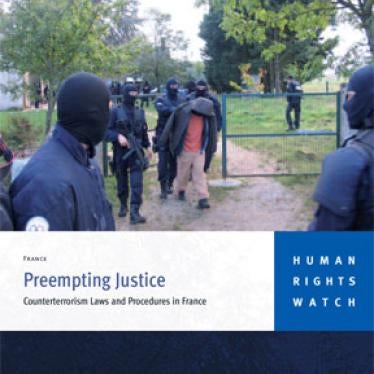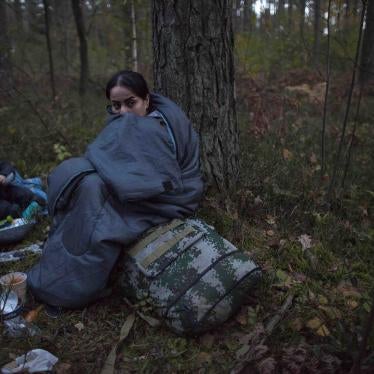(Paris) – France should urgently carry out recommendations from a top United Nations human rights body critical of its approach to counterterrorism, Human Rights Watch said today in a letter to the French government.
“The UN has given France a roadmap to bring its counterterrorism policies into line with human rights requirements,” said Jean-Marie Fardeau, director of Human Rights Watch’s Paris office. “France sees itself as a leader on human rights. It should demonstrate that leadership by moving promptly to implement the findings of the UN’s key rights body.”
In a report issued following an in-depth review in July 2008, the UN Human Rights Committee expressed concern that France’s counterterrorism policies do not fully comply with international fair trial standards and that they put individuals at risk of being returned to nations where they could be subject to torture. The committee, composed of internationally recognized experts, assesses compliance with the International Covenant on Civil and Political Rights.
Among the problems highlighted in its report on France are:
- Lack of appropriate safeguards during police custody. Terrorism suspects can be held in police custody for up to six days before being brought before a judge. They can be held for up to 72 hours before being given access to a lawyer. Like other criminal suspects in France, they are not informed of their right to remain silent under questioning. Research by Human Rights Watch has found that the lack of safeguards means that terrorism suspects in France are often subject to oppressive questioning in police custody.
- Lengthy pre-trial detention. Terrorism suspects can be detained for up to four years and eight months before trial. “[T]he institutionalized practice of extended detention for investigative purposes … is difficult to reconcile with the right guaranteed in the Covenant to be tried within a reasonable time,” the committee said in its report.
- Inadequate protection against removal to risk of ill-treatment. There is no provision to suspend automatically an order for deportation in national security cases when an appeal is filed, even when individuals allege that they face torture or ill-treatment in the destination country. Another UN body, the Committee against Torture, has twice criticized France since 2005 for deporting individuals who had raised fear of torture on return before their appeals had been fully examined.
“This criticism from the UN tarnishes France’s leadership on counterterrorism and its global efforts to promote respect for human rights,” said Fardeau. “If France listens to the UN and implements its recommendations, it can strengthen its position on both counts. Parliament can also help by monitoring the process.”
Similar concerns about France’s human rights safeguards in its approach to the prosecution of terrorism offenses were expressed during the May 2008 examination of France’s human rights record under the newly established universal periodic review procedure at the UN Human Rights Council.
The Human Rights Committee’s recommendations to the French government include:
- Providing any suspect ordered to be forcibly removed from France with time to file for asylum, the services of a translator and a guarantee that the removal order will be suspended until the process is completed.
- Informing anyone arrested on a criminal charge, including terrorism suspects, of the right to remain silent and providing a right to see a lawyer immediately. The suspect should be promptly brought before a judge.
- Limiting pre-trial detention and strengthening the authority of the judges who determine whether to place someone in detention awaiting trial.
The Human Rights Committee also expressed concern about a recent law allowing detention of certain former violent offenders for one-year renewable periods after they have served their prison sentence, concluding that it called into question the right to the presumption of innocence and the right not to be punished twice for the same crime. The Committee recommended that the law be re-examined in light of France’s obligations under the ICCPR.







